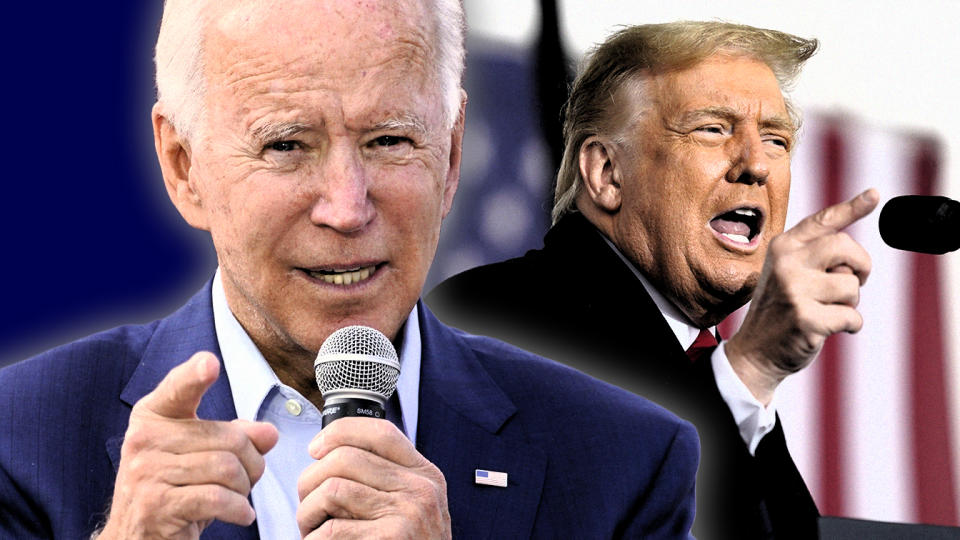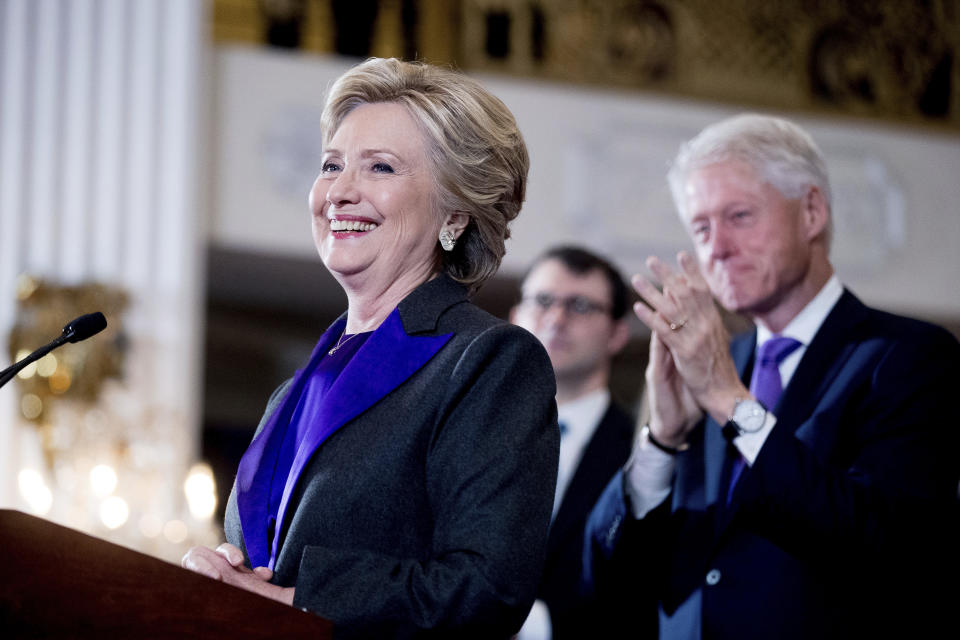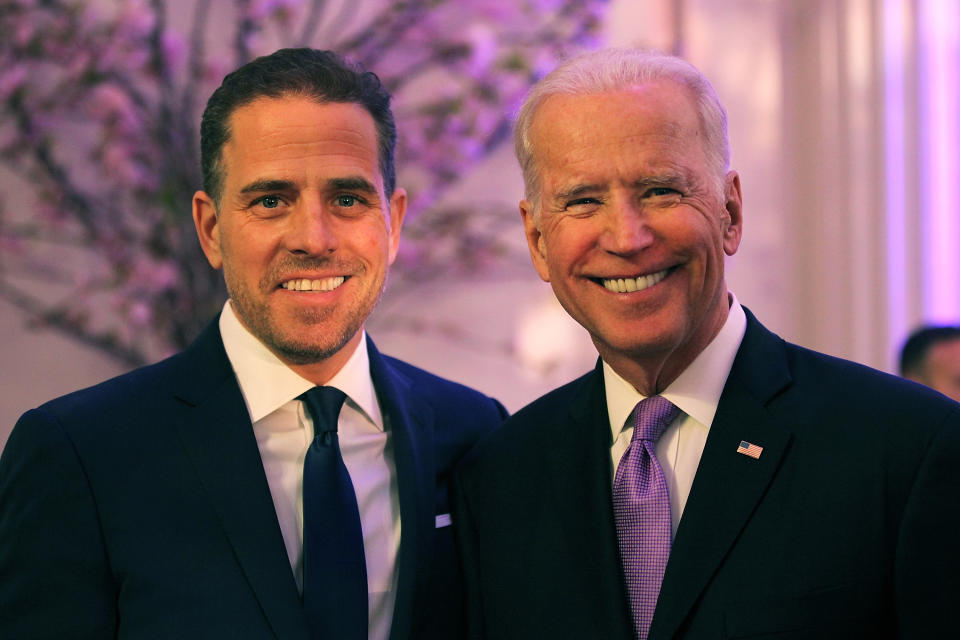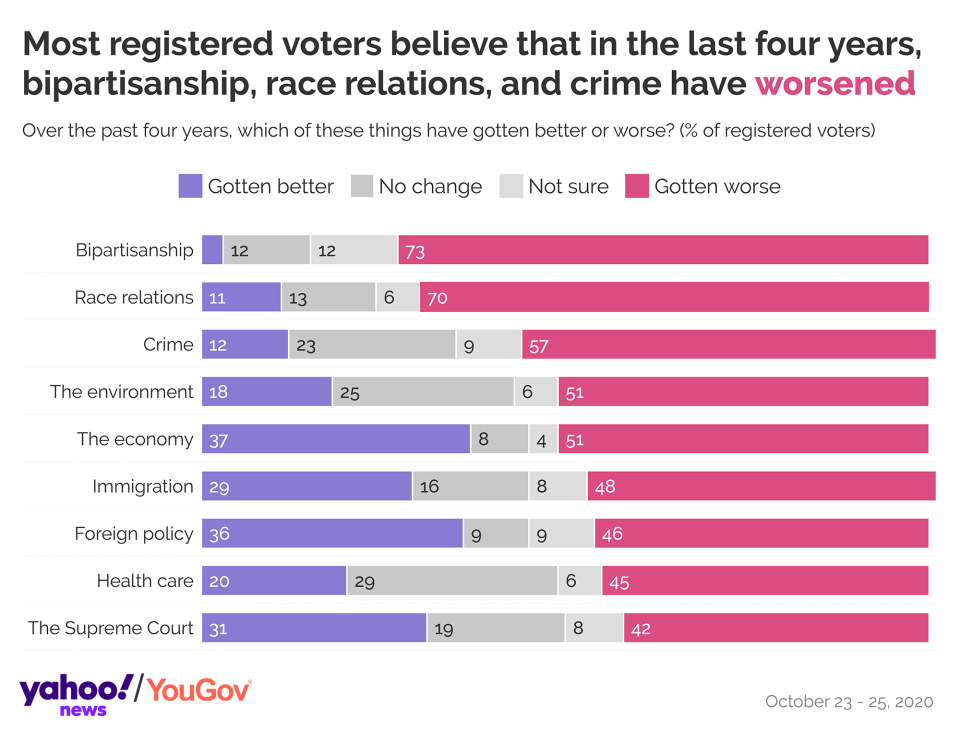Yahoo News/YouGov poll: With one week left, Biden's lead over Trump grows to 12 points — his biggest yet
Heading into the final week of the 2020 presidential campaign, former Vice President Joe Biden now holds his largest-ever lead over President Trump, according to a new Yahoo News/YouGov poll — a 12-point margin that’s four times the size of Hillary Clinton’s national advantage over Trump at this point in 2016.
The survey, which was conducted from Oct. 23 to 25, found that 54 percent of likely voters have either already voted for Biden or plan to vote for him by Election Day. Just 42 percent of likely voters say they are casting their ballots for Trump.
In comparison, a YouGov poll conducted one week before the 2016 election showed Clinton leading Trump by 3 percentage points among likely voters, 48 percent to 45 percent; at that stage, the average of all national surveys gave Clinton a lead of 2.2 percentage points.

As the polls predicted, Clinton wound up winning the national popular vote by 2.1 points, 48.2 percent to 46.1 percent — even as a combined 77,000 votes in Michigan, Wisconsin and Pennsylvania put Trump over the top in the Electoral College.
None of these numbers guarantees a Biden victory, let alone a dozen-point landslide. No candidate since Ronald Reagan in 1984 has won the presidency by a double-digit margin, and no incumbent since Herbert Hoover in 1932 has lost by more than 10.

Yet the new Yahoo News/YouGov poll underscores how much more challenging it will be than it was in 2016 for Trump to pull off another upset on Election Day.
According to the survey, Biden is stronger than Clinton with every key demographic group:
Just 3 percent of 2016 Clinton voters say they are now voting for Trump. More than twice as many 2016 Trump voters (7 percent) say they are voting for Biden.
The Democrat leads by 9 points (45 percent to 36 percent) among independents — a bloc that Trump won by 4 points (46 percent to 42 percent) in 2016.
Four years ago, Trump trounced Clinton by 20 points (57 percent to 37 percent) among white voters. Today, Biden trails by just 3 points (47 percent to 44 percent).
There has been a similar swing among suburban voters, who backed Trump by 4 percentage points in 2016 (49 percent to 45 percent) but now favor Biden by 14 (52 percent to 38 percent).
Meanwhile, the former vice president is ahead by a nearly 2-to-1 margin among those who voted third party in 2016 or didn’t vote at all — an advantage that adds 4 percentage points to his overall lead.
As a result, the same forecaster who gave Trump a 28.8 percent chance of winning one week before the 2016 election now gives him a 12 percent chance of winning.
One-in-eight isn’t nothing; the president could still get reelected. But again, Trump is facing steeper odds now than in 2016. The numbers suggest two reasons why.
The first is that he’s running out of time. With expanded access to early voting due to the coronavirus pandemic, more than half of all likely voters (56 percent) say they have already cast their ballots, according to the Yahoo News/YouGov poll, up from 38 percent last week. With eight days still left to go, election offices have tallied 61 million early votes, which exceeds the total number of early votes cast in all of 2016 by 14 million. So far, registered Democrats have cast the vast majority of these votes. YouGov expects about 85 million people to have voted by the end of this week.
The problem for Trump is that the more votes Biden banks, the fewer minds he can potentially change at the last minute. In 2016, Trump benefited from eleventh-hour news about Clinton’s emails that helped convince most of that year’s relatively large pool of undecided voters to break his way. But while he has seized on reports about a laptop allegedly belonging to Biden’s son Hunter to accuse the former vice president of unspecified wrongdoing, the Yahoo News/YouGov poll suggests this gambit has yet to move any votes.

Most voters say they have heard either a lot (39 percent) or a little (38 percent) about the laptop, and views are predictably polarized on whether the media is paying enough attention, with 77 percent Trump voters saying there’s been too little coverage of the controversy and three-quarters of Biden voters saying there’s either been too much (56 percent) or about the right amount (19 percent). The same goes for views on Joe Biden’s involvement: 82 percent of Trump voters are convinced the former vice president did something wrong, while 79 percent Biden voters are sure he didn’t.
The survey does show that independents are evenly divided (41 percent yes vs. 40 percent no) on the question of whether Biden committed any wrongdoing. Yet by an 11-point margin, independents also say Trump and his family are more “corrupt” (50 percent) than Biden and his family (39 percent) — a view shared by the majority of registered voters (53 percent to 39 percent).
And so unless new information about Hunter Biden’s laptop emerges between now and Election Day, persuadable voters seem unlikely to gravitate toward Trump because of concerns about the Bidens. Even then, Trump couldn’t rely solely on persuadable voters to make this a winning issue — there simply aren’t enough of them. According to the poll, a mere 3 percent of voters remain undecided; likewise, just 3 percent of Biden voters say there is “a chance I will change my mind between now and the election.” Instead, any late-breaking news would have to be so shocking as to trigger widespread defections among the shrinking number of solid Biden supporters who have not yet voted.
The final debate, held last Thursday, was also a missed opportunity for the president. With time running out to alter the dynamic of the race, 48 percent of voters who watched say Biden won the encounter, versus just 41 percent who say Trump won.
The second reason Trump faces steeper odds than four years ago is that while Biden’s advantage across the key battleground states (about 4 to 6 percentage points) is smaller than his average national lead (about 9 percentage points), it’s larger than Clinton’s battleground edge one week before the 2016 election.

Back then, many state polls underestimated Trump’s final share of the vote, which is why his narrow wins in Michigan, Wisconsin and Pennsylvania seemed so surprising. It’s unlikely that surveys taken in 2020 will be off by the same amount, and in the same direction, as they were in 2016; pollsters have adjusted their methodology so as not to repeat their mistake of undercounting voters without a college education, especially white, rural ones, and the polls for the 2018 midterms were more accurate in this regard. Also, polling errors rarely repeat themselves from cycle to cycle; in 2012, for instance, the state and national polls underestimated Barack Obama’s support by nearly 4 points.
Yet either way, Biden’s overall lead is so substantial that he would still be in position to win 280 electoral votes even if the state polls were precisely as wrong as they were in 2016, according to a New York Times analysis. If Biden were to win the states he currently leads by 3 points or more, meanwhile, he would win 341 electoral votes. A candidate needs 270 electoral votes to secure the presidency.
The Yahoo News/YouGov poll illustrates the breadth and depth of Biden’s advantage. Asked about a variety of issues, either a majority or a plurality of registered voters say, by substantial margins, that all of them have gotten worse over the last four years: bipartisanship (+70 percent worse), race relations (+59 percent), crime (+45 percent), the environment (+33 percent), health care (+25 percent), immigration (+19 percent), the economy (+14 percent), the Supreme Court (+11 percent) and foreign policy (+10 percent).
Asked which candidate would do a better job handling each of these issues, a plurality or majority of registered voters say Biden rather than Trump: on race relations (52 percent to 33 percent); health care (51 percent to 37 percent); the environment (54 percent to 30 percent); bipartisanship (45 percent to 25 percent); immigration (48 percent to 40 percent); foreign policy (47 percent to 40 percent) and the Supreme Court (45 percent to 39 percent).

Biden even leads Trump on the economy (45 percent to 43 percent) and crime (43 percent to 40 percent) — issues commonly thought to be Trump’s strongest. On the biggest challenge confronting America, the coronavirus pandemic, voters think Biden would do a better job than Trump by 16 percentage points (50 percent to 34 percent).
In a similar vein, there is only one issue — boosting the stock market — that a majority of registered voters (54 percent) describe as a “major accomplishment of the Trump administration.” Among the issues that most voters list as “major failures” of the Trump administration? Managing COVID-19 (62 percent), helping Black Americans (55 percent), protecting people with preexisting health conditions (51 percent) and “draining the swamp” (51 percent).
Asked whether “things are normal in America right now,” 89 percent of registered voters say no. In the midst of a global pandemic, half (50 percent) say the president is “the main reason” why things aren’t normal. Just 44 percent say he isn’t.
Voters aren’t convinced that Biden can usher in a return to normalcy; 46 percent predict he won’t, compared with only 35 percent who predict he will. But as Nov. 3 approaches, most seem to be coming to the conclusion that not-quite-normal life under Biden is at least better than the alternative — and the election is increasingly looking like his to lose.
______________
The Yahoo News survey was conducted by YouGov using a nationally representative sample of 1,500 U.S. registered voters interviewed online from Oct. 23 to 25. This sample was weighted according to gender, age, race and education based on the American Community Survey, conducted by the U.S. Bureau of the Census, as well as 2016 presidential vote, registration status, geographic region and news interest. Respondents were selected from YouGov’s opt-in panel to be representative of all U.S registered voters. The margin of error is approximately 3.0 percent.
_____
Read more from Yahoo News:





